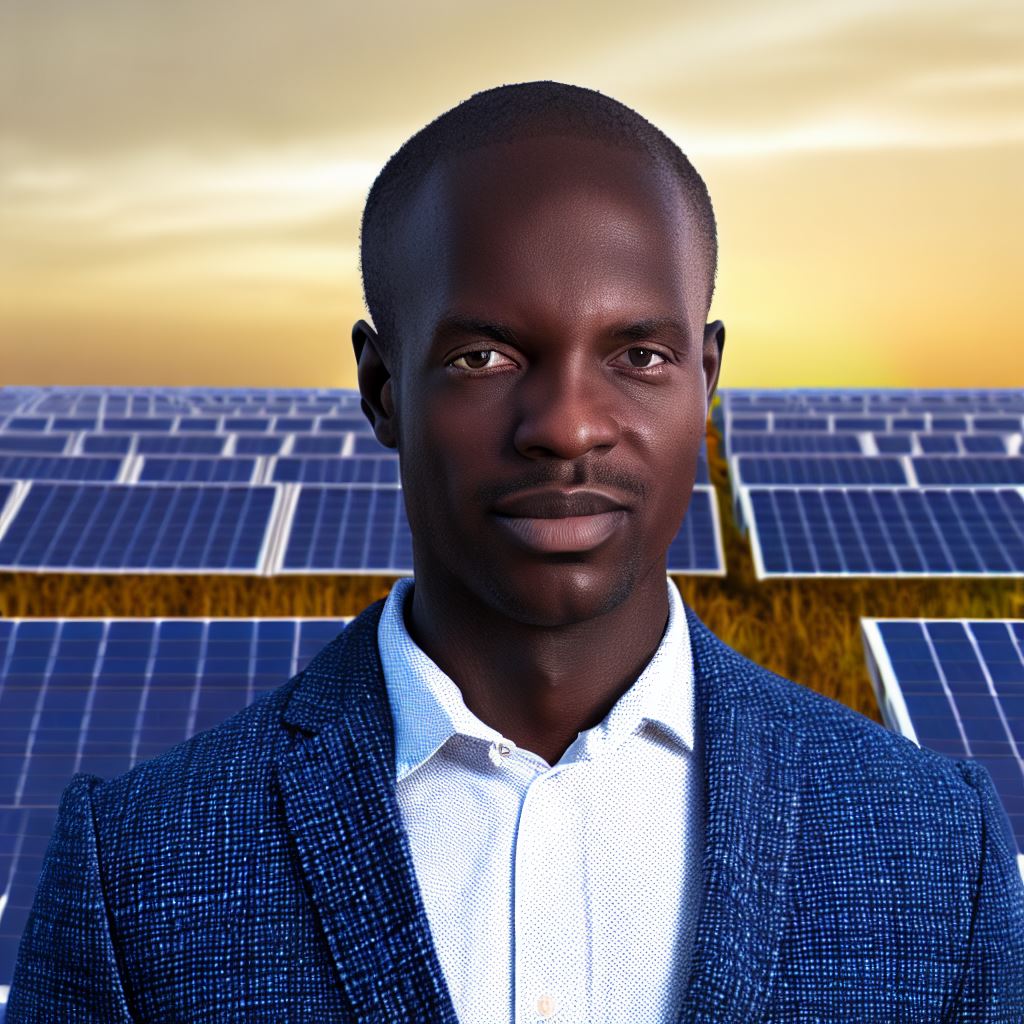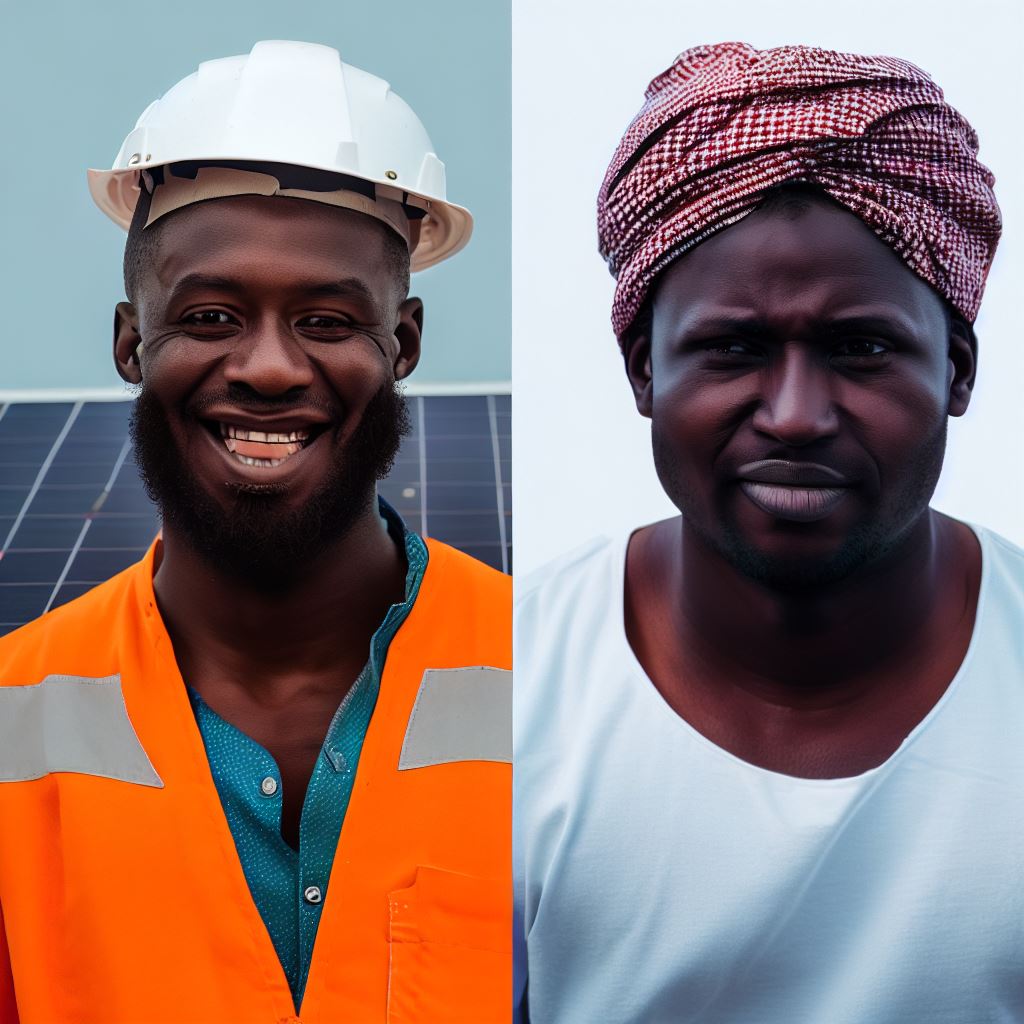Introduction
Solar photovoltaic installations play a crucial role in harnessing renewable energy sources.
Solar energy is of utmost importance in Nigeria due to its abundant sunlight resources
Thesis statement:
This blog section will explore the current trends in solar photovoltaic installation in Nigeria.
Solar photovoltaic installations are becoming increasingly popular throughout the world. These systems capture sunlight and convert it into usable electricity.
In Nigeria, solar energy is playing a vital role in addressing the country’s energy challenges. With its abundant sunlight, harnessing solar power can provide a sustainable and reliable source of electricity.
Nigeria faces numerous energy-related issues, such as unreliable grid connections and an overreliance on fossil fuels.
Solar photovoltaic installations offer a promising solution as they are clean, renewable, and can be implemented at various scales, from individual homes to large-scale solar farms.
By embracing solar energy, Nigeria can reduce its dependence on fossil fuels, mitigate climate change, and improve access to electricity in remote areas.
The current trends in solar photovoltaic installation in Nigeria are worth exploring. The country has seen a significant increase in the adoption of solar power systems in recent years.
This is driven by favorable government policies, reduced equipment costs, and growing awareness of the benefits of renewable energy.
Additionally, the emergence of innovative financing models, such as pay-as-you-go schemes, has made solar energy more accessible and affordable for households and businesses.
In this blog section, we will delve into the specific trends in solar photovoltaic installation in Nigeria.
We will examine the growth of rooftop solar installations in urban areas, the development of mini-grids in rural communities, and the potential for utility-scale solar projects.
By understanding these trends, we can gain insights into the future trajectory of solar energy in Nigeria and the opportunities it presents for sustainable development.
Solar Photovoltaic Market in Nigeria
Overview of Nigeria’s energy landscape
- Nigeria’s energy landscape is heavily dependent on fossil fuels.
- The country is one of the largest oil producers in Africa.
- However, Nigeria faces numerous challenges in providing stable and reliable electricity to its population.
- There is a lack of infrastructure and frequent power outages are common.
- Only about 40% of Nigerians have access to electricity.
Need for alternative sources of energy
- Due to the unreliable nature of the current electricity supply, there is a growing need for alternative sources of energy.
- Alternative energy can help diversify Nigeria’s energy sources and reduce its dependence on fossil fuels.
- This can lead to a more sustainable and environmentally friendly energy sector.
Potential for solar energy in Nigeria
- Nigeria has abundant solar resources and experiences high levels of solar radiation throughout the year.
- The country is located near the equator, which makes it ideal for solar photovoltaic (PV) installations.
- Solar energy can provide a reliable and affordable source of electricity in remote areas without access to the grid.
- It can also supplement the current electricity supply, reducing the strain on the grid.
- Solar PV installations can be deployed on rooftops, open land, and even integrated into existing infrastructure.
- There is a large potential for job creation in the solar PV sector, which can contribute to Nigeria’s economic growth.
In short Nigeria’s solar photovoltaic market has significant potential due to its abundant solar resources and the need for alternative sources of energy.
Investing in solar energy can help Nigeria address its energy challenges, expand access to electricity, and reduce its carbon footprint.
The development of the solar PV sector can also create jobs and stimulate economic growth.
It is crucial for Nigeria to tap into its solar energy potential and establish supportive policies and incentives to accelerate the adoption of solar photovoltaic installations in the country.
Read: Earnings Insight: What Do Janitors Earn in Nigeria?
Government Policies and Incentives
Federal Government support for solar projects
- The Nigerian Federal Government is providing substantial support for solar projects in the country.
- Various initiatives have been launched to promote the adoption of solar photovoltaic installations.
- The government has established funds and grants to provide financial assistance for solar projects.
- These funds aim to encourage the development of solar infrastructure and increase renewable energy capacity in Nigeria.
- The support from the government has attracted both local and foreign investors to the solar sector.
Tax exemptions and incentives
- The Nigerian government has introduced tax exemptions and incentives to promote solar photovoltaic installations.
- Investors in solar projects can benefit from tax breaks and waivers on import duties for solar equipment.
- These incentives reduce the cost of installing solar PV systems and encourage further investment in the sector.
- Tax exemptions also encourage the growth of local manufacturing and assembly of solar components, creating job opportunities.
Renewable Energy Feed-in Tariff
The Nigerian government has implemented a Renewable Energy Feed-in Tariff (REFIT) program for solar energy.
REFIT ensures guaranteed pricing for solar power producers. The pricing exceeds production costs, providing financial security and incentives for investors.
Additionally, REFIT establishes a standard power purchase agreement, simplifying the process for solar project developers.
This program has attracted private sector investment and accelerated solar PV installations.
Government policies and incentives drive solar photovoltaic installations in Nigeria. Federal support fosters a favorable environment for local and foreign investments.
Funds, grants, and financial assistance encourage solar infrastructure development, boosting renewable energy capacity and the local economy.
They also stimulate manufacturing and assembly plants, creating jobs.
Tax exemptions and incentives further enhance solar project attractiveness.
Tax breaks and import duty waivers on solar equipment reduce installation costs, promoting affordability.
These incentives support local manufacturing and assembly, bolstering the domestic solar industry.
The Renewable Energy Feed-in Tariff (REFIT) program is a game-changer for Nigerian solar energy.
It guarantees fixed solar electricity prices, ensuring investor financial security and long-term incentives. Standardized power purchase agreements simplify solar project development, expediting PV installations.
In a nutshell, government policies, Federal support, tax exemptions, and the REFIT program have significantly boosted solar photovoltaic installations in Nigeria.
These measures attract investments, cut costs, and speed up solar energy adoption, promoting a sustainable future.
Read: How to Become a Janitor in Nigeria: A Complete Guide
Key Players in the Industry
Overview of local solar companies
- GreenEnergie Nigeria Limited: A leading provider of solar energy solutions in Nigeria.
- Solarpower Nigeria: Specializes in the design, installation, and maintenance of solar photovoltaic systems.
- Nigeria Solar Capital Partners: Offers financing options for solar projects in Nigeria.
- Solarforce Nigeria Limited: Provides solar power solutions for residential, commercial, and industrial clients.
- Solar Energy Kobo: A social enterprise that distributes affordable solar products to low-income communities.
International companies investing in Nigeria
- First Solar: An American photovoltaic manufacturer that has invested in utility-scale solar projects in Nigeria.
- SunPower Corporation: A global solar energy company that has partnered with local firms to install solar PV systems.
- Canadian Solar: Invested in solar power projects in Nigeria, contributing to the country’s renewable energy goals.
- Schneider Electric: Collaborated with Nigerian companies to develop and deploy solar solutions.
- Eni: The Italian energy company has invested in Nigeria’s solar market, supporting off-grid solar initiatives.
Partnerships and collaborations
GreenEnergie Nigeria Limited partnered with Schneider Electric for rural solar mini-grids. Solarpower Nigeria collaborated with First Solar for a large-scale solar farm.
Nigeria Solar Capital Partners formed strategic alliances with local banks for solar financing.
Solarforce Nigeria Limited joined forces with SunPower Corporation for top-quality solar products.
Solar Energy Kobo partnered with international NGOs to distribute solar lanterns in off-grid areas.
These solar industry leaders drive PV installation growth in Nigeria via expertise, resources, and partnerships.
Local firms meet Nigeria’s energy needs efficiently. International companies bring tech, knowledge, and funding, highlighting Nigeria’s renewable energy potential.
Collaborations foster innovation, best practice sharing, quality solar products, and financing accessibility.
With these efforts, Nigeria’s solar PV installations will grow, supporting renewable energy goals and powering remote areas.
Nurturing these players and creating an investment-friendly environment is crucial. Policy incentives and sustainable regulatory frameworks should promote solar energy growth.
Leveraging local-international partnerships maximizes Nigeria’s solar potential for a sustainable energy future.
Technological Advancements
A significant factor driving the growth of solar photovoltaic (PV) installation in Nigeria is technological advancements.
These advancements have led to improvements in various aspects of solar PV systems, making them more efficient and reliable.
Improvements in solar panel efficiency
Solar panel efficiency has seen remarkable improvements over the years due to technological advancements.
The development of higher efficiency solar cells has resulted in increased power output from solar panels.
With improved efficiency, solar panels can generate more electricity from the same amount of sunlight, making them more cost-effective and attractive for installation in Nigeria.
Increased solar panel efficiency also means that installations require fewer panels to achieve the desired power output, saving space and reducing installation costs.
Energy storage solutions
Energy storage solutions have become another crucial technological advancement in the solar PV industry in Nigeria.
Battery storage systems enable solar PV installations to store excess electricity generated during the day for later use during periods of low sunlight or at night.
This technology enhances the reliability and availability of solar energy, allowing users to access electricity even when the sun is not shining.
It also provides a solution for addressing the intermittent nature of renewable energy sources.
Energy storage solutions are particularly beneficial in remote areas of Nigeria where grid-connected electricity is limited or absent, enabling off-grid solar PV installations to provide continuous power supply.
Remote monitoring and control systems
The rise of remote monitoring and control systems has significantly impacted the solar PV installation sector in Nigeria.
Through the use of advanced sensors and communication technology, these systems enable real-time monitoring of solar PV installations.
This allows for proactive maintenance and troubleshooting, ensuring optimal performance and minimizing downtime.
The ability to remotely control and monitor solar PV installations also improves operational efficiency by enabling adjustments to be made to optimize performance.
In addition, remote monitoring and control systems provide valuable data on electricity generation and consumption, aiding in system optimization and energy management.
In fact, technological advancements have played a crucial role in the growth of solar PV installation in Nigeria.
Improvements in solar panel efficiency have made solar PV systems more cost-effective and space-efficient.
Energy storage solutions have addressed the intermittent nature of solar energy, enabling reliable power supply even during low sunlight periods.
Remote monitoring and control systems have improved operational efficiency and allowed for proactive maintenance and troubleshooting.
These technological advancements are driving the adoption of solar PV installations, contributing to Nigeria’s transition towards a more sustainable and renewable energy future.
Read: The State of Janitorial Services in Nigeria Today
Funding and Financing Options
Availability of grants and loans
There are numerous grants and loans available for solar photovoltaic installation projects in Nigeria.
These options provide necessary financial support to individuals and businesses to undertake solar energy initiatives.
Grants are non-repayable funds given by governments, organizations, or foundations, while loans are borrowed funds that need to be repaid with interest.
Microfinancing initiatives
Microfinancing initiatives have also emerged as an important source of funding for solar photovoltaic installations in Nigeria.
These initiatives aim to provide small loans to low-income individuals and communities who otherwise may not have access to traditional financing options.
They help empower people to invest in sustainable energy solutions and contribute to the country’s renewable energy goals.
Impact of international funding organizations
International funding organizations play a significant role in promoting solar photovoltaic installations in Nigeria.
These organizations provide financial support, technical assistance, and expertise to help bridge the funding gap and promote renewable energy development.
They also facilitate partnerships between local stakeholders and international investors, contributing to the growth of the solar sector in the country.
Additionally, international funding organizations often collaborate with local governments and organizations to establish favorable policies and frameworks that attract investment in the solar industry.
They help create an enabling environment for financing options to thrive and encourage private sector participation in solar projects.
Through their support, these organizations also promote capacity building and knowledge transfer, ensuring that solar photovoltaic installation projects are efficiently planned, implemented, and maintained.
This contributes to the long-term sustainability and success of the solar energy sector in Nigeria.
In essence, the availability of grants, loans, microfinancing initiatives, and the impact of international funding organizations have significantly influenced the trends in solar photovoltaic installation in Nigeria.
These financial options have provided crucial support to individuals, businesses, and communities to embrace renewable energy and contribute to the country’s energy transition.
The collaboration between local stakeholders and international organizations has accelerated the growth of the solar sector, creating a more sustainable and environmentally friendly future for Nigeria.
Read: Spotlight: Successful Industrial Psychologists in Nigeria

Challenges and Solutions
Lack of public awareness and education
- Limited knowledge about solar photovoltaic (PV) technology among the general public.
- Insufficient education on the benefits of solar PV installations for sustainable energy.
- Lack of information about available government incentives and support for solar PV adoption.
- Failure to highlight the positive impact of solar PV on the environment and energy security.
- Solution: Implement awareness campaigns to educate the public about solar PV and its advantages.
- Collaborate with educational institutions to include renewable energy in their curriculum.
Initial high installation and equipment costs
- Expensive solar PV equipment, including panels, inverters, and batteries, make installations financially challenging.
- High installation costs hinder individuals and businesses from investing in solar PV systems.
- Limited access to affordable financing options for solar PV installations.
- Solution: Develop government-led initiatives to provide financial incentives, grants, and subsidies for solar PV installations.
- Collaborate with financial institutions to create special loan programs for solar PV projects.
- Promote the use of locally manufactured solar PV components to reduce import costs.
Disruptions caused by intermittent power supply
- Frequent power outages and unstable electricity supply negatively affect solar PV systems’ performance.
- Inconsistent power supply disrupts the continuous generation of solar energy.
- These disruptions limit the effectiveness and reliability of solar PV installations.
- Solution: Improve the grid infrastructure and invest in energy storage systems to address intermittent power supply.
- Encourage the adoption of hybrid solar PV systems with battery storage to ensure uninterrupted power supply.
- Develop microgrid systems to serve areas with unreliable electricity supply.
Government corruption and bureaucratic hurdles
- Corruption and bureaucratic inefficiencies hinder the growth and development of the solar PV sector.
- Delays in regulatory approvals and permits increase project costs and discourage investments.
- Lack of transparency and accountability in government dealings affect the credibility of solar PV projects.
- Solution: Implement strong governance frameworks to prevent corruption and streamline bureaucratic processes.
- Create a transparent and efficient regulatory system for solar PV installations.
- Establish an independent oversight body to monitor and enforce regulations in the solar PV sector.
In review, the challenges faced in solar photovoltaic installation in Nigeria can be overcome through various solutions.
Increasing public awareness, addressing high installation costs, improving power supply reliability, and tackling corruption are crucial steps in promoting the adoption of solar PV.
With the implementation of these solutions, Nigeria can harness the abundant solar energy resources and achieve its renewable energy goals.
Case Studies
Successful solar photovoltaic projects in Nigeria
- The DOWA Renewable Energy project in Kano State has successfully installed solar photovoltaic panels in different communities.
- This project has provided reliable electricity to schools, hospitals, and households, improving their quality of life.
- Another successful project is the SolarGen Power Station in Lagos, which supplies clean energy to over 1,000 households.
- The SolarGen Power Station has reduced dependence on fossil fuels and contributed to a significant reduction in carbon emissions.
- The Bright Future Solar project in Abuja has installed solar panels to provide electricity to streetlights in the city.
- This initiative has improved safety and security in Abuja, making it a more livable and sustainable city.
Community-based initiatives and their impact
- The Shehu Solar Network in Sokoto State is a community-based initiative that promotes the use of solar photovoltaic systems.
- Through training and awareness programs, the Shehu Solar Network has empowered communities to adopt solar energy solutions.
- This initiative has not only reduced electricity costs for households but also created local job opportunities in solar installation and maintenance.
- The Olumide Solar Cooperative in Ogun State is another community-based initiative that has successfully implemented solar projects.
- The Olumide Solar Cooperative has brought together community members to invest in solar energy infrastructure and share the benefits.
- These community-based initiatives have shown that local engagement plays a crucial role in spreading solar photovoltaic installations.
Rural electrification efforts through solar installations
- In rural communities where traditional electricity grids are not accessible, solar installations have brought significant changes.
- The Light Up Rural Nigeria project in Kwara State has provided electricity to remote villages using solar panels.
- This project has improved the standard of living by enabling access to reliable and clean energy for cooking, lighting, and education.
- The Solar for All program in Enugu State has also focused on rural electrification through solar installations.
- With the implementation of Solar for All, numerous schools and healthcare centers now have access to electricity, positively impacting healthcare services and education.
- These rural electrification efforts have demonstrated the potential of solar photovoltaic installations to bridge the energy gap in remote areas.
In general, Nigeria has witnessed successful solar photovoltaic projects, community-based initiatives, and rural electrification efforts.
These case studies showcase the positive impact of solar installations in improving the quality of life, promoting sustainability, and bridging the energy gap in Nigeria.
With continued support and investment in solar energy, Nigeria can further accelerate its transition towards a cleaner and more sustainable future.
Future Outlook for Solar Photovoltaic Installation in Nigeria
Projections for growth and expansion
- Nigeria’s solar photovoltaic industry is expected to experience significant growth and expansion in the coming years.
- The government has set a target to increase the country’s solar power generation capacity to 30% by 2030.
- Investments in solar photovoltaic installations are projected to increase due to the declining costs of solar technology.
- With favorable policies and incentives, Nigeria has the potential to attract more foreign investments in the solar sector.
- The demand for electricity in Nigeria is on the rise, and solar photovoltaic installations can help meet this growing demand.
Potential for decentralized solar systems
- Nigeria has a large population living in rural and off-grid areas, where access to electricity is limited.
- Decentralized solar systems, such as off-grid solar installations and mini-grids, offer a viable solution to address this energy deficit.
- The government’s focus on decentralized solar systems can promote energy access in remote areas and stimulate economic development.
- The decreasing costs of solar technology make decentralized solar systems more affordable and accessible to communities without access to the main grid.
- The potential for decentralized solar systems in Nigeria is immense and can contribute significantly to the country’s energy transition.
Role of solar energy in achieving sustainable development goals
- Solar energy plays a crucial role in achieving Nigeria’s sustainable development goals.
- Solar photovoltaic installations help mitigate climate change by reducing reliance on fossil fuels and lowering carbon emissions.
- The use of solar energy can contribute to the diversification of Nigeria’s energy mix, reducing dependence on traditional sources.
- Solar power installations create job opportunities in the renewable energy sector, promoting economic growth and poverty alleviation.
- Access to affordable and clean energy through solar photovoltaic systems improves the quality of life for Nigerians and supports social development.
When all is said and done, the future outlook for solar photovoltaic installation in Nigeria is promising.
The country is projected to experience substantial growth and expansion in the solar sector.
The potential for decentralized solar systems provides a solution for rural and off-grid areas, ensuring access to electricity for all Nigerians.
Furthermore, solar energy plays a vital role in achieving sustainable development goals, including climate action, economic growth, and poverty alleviation.
With the right policies and investments, Nigeria can harness the power of solar energy for a brighter and sustainable future
Discover More: Insider’s View: A Day in a Lagos Waiter’s Life
Conclusion
Recap of the main points
In this section, we have explored the trends in solar photovoltaic installation in Nigeria.
We discussed the increasing adoption of solar energy, the government’s support, and the challenges faced.
Optimistic outlook for the future of solar photovoltaic installation in Nigeria
Despite the challenges, there is a positive outlook for solar photovoltaic installation in Nigeria.
The government’s commitment to renewable energy and the decreasing costs of solar equipment contribute to this optimistic view.
Call to action for individuals, businesses, and policymakers to embrace solar energy
To ensure a sustainable future, it is essential for individuals, businesses, and policymakers in Nigeria to embrace solar energy.
This involves investing in solar systems, promoting awareness, and implementing favorable policies.
All in all, the trends in solar photovoltaic installation in Nigeria are promising.
With continued support and collaboration, solar energy can play a significant role in meeting Nigeria’s growing energy demands while reducing reliance on fossil fuels.
The potential for job creation, energy affordability, and environmental benefits make solar power an attractive option.
Let us join forces to embrace solar energy and contribute to a brighter and greener future for Nigeria.




